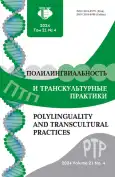Congratulation Genre in the Even Language
- Авторлар: Nesterova E.V.1
-
Мекемелер:
- Institute for Humanitarian Research and North Indigenous People Problemsof Siberian Branch of the Russian Academy of Sciences
- Шығарылым: Том 21, № 4 (2024)
- Беттер: 658-667
- Бөлім: Language in System
- URL: https://journal-vniispk.ru/2618-897X/article/view/326889
- DOI: https://doi.org/10.22363/2618-897X-2024-21-4-658-667
- EDN: https://elibrary.ru/DHBZLR
- ID: 326889
Дәйексөз келтіру
Толық мәтін
Аннотация
The study considers the main features of the speech congratulation genre in the Even language. The relevance of the study is due to the need to study and describe the texts of natural written speech of the speakers of the disappearing Even language. At present, congratulation is one of the developing speech genres in the Even language. The study of this linguistic phenomenon will give an idea of the current state of the Even language and reveal various tendencies of written speech of modern speakers. The object of the undertaken research is the speech congratulation genre in the Even language, the subject of the study is the structural, lexical and stylistic features of the genre. The aim of the work is to describe the peculiarities of the Evennish greetings. The main material of the study was the texts of messages from WhatsApp messenger. The descriptive method was applied, the techniques of linguistic observation, generalisation and interpretation were used. The time of new digital technologies, the unified Russian cultural environment have served the development of the speech congratulations genre in the Even language. As a result of the study, three types of congratulations were identified: brief, full, extended. The main semantic dominants of congratulatory speech were identified: well-being, happiness, health. Frequent expressive means of congratulations are personifications, metaphors, lexical repetitions, synonyms. The active influence of the Russian language can be traced in the texts of congratulations: the structure of congratulations is borrowed, and Russian expressions are often used. At the same time, the traditional images associated with the environment are used in congratulations, for example: sun, deer. The functioning of lexemes subjected to the expansion of lexical meanings of words, activation of units of the passive vocabulary fund, formation of neologisms and speech formulas is revealed. The text of congratulations is a sample of expression of the speech personality of a modern speaker of Even language and reflects the degree of mastery of the native language, the ability to handle expressive means.
Негізгі сөздер
Авторлар туралы
Elena Nesterova
Institute for Humanitarian Research and North Indigenous People Problemsof Siberian Branch of the Russian Academy of Sciences
Хат алмасуға жауапты Автор.
Email: elenanesterova-2010@mail.ru
ORCID iD: 0000-0001-5130-706X
SPIN-код: 8214-0039
PhD in Philology, Senior Researcher of the Department of Northern Philology
1 Petrovskogo St., Yakutsk, 677015, Russian Federation, Republic of Sakha (Yakutia)Әдебиет тізімі
- Bakhtin, M.M. 1979. Aesthetics of verbal creativity. Moscow: Iskusstvo publ. Print. (In Russ.)
- Shmeleva, T.V. 1997. “Model of speech genre.” In Genres of speech, issue 1, pp. 88–98.
- Shmeleva, T.V. 1999. Etiquette genres of Russian speech: gratitude, apology, congratulation, condolence. Krasnoyarsk. Print. (In Russ.)
- Sukhoterina, T.P. 2015. “Hypergenre of natural written speech “Congratulations” as a phenomenon of phatic communication.” The world of science, culture, and education, vol. 2, no. 51, pp. 396–398. Print. (In Russ.)
- Dutkin, H.I. 1996. Even folklore. Yakutsk: YaSU publ. Print. (In Russ.)
- Robbek, V.A. 2005. Even-Russian Dictionary. Novosibirsk: Nauka publ. Print. Print. (In Russ.)
- Kosorukova, A.A. 2018. “Ethics of messengers: problems of epistolary communication in the context of information technology development.” Gumanitarnyj vestnik, vol. 9, no. 71, pp. 1–10. Print. (In Russ.)
- Krasnoperova, Y.V. 2012. “About the concept of “speech genre” in modern linguistics”. Modern Problems of Science and Education, no. 6. 18 Feb 2024, https://science-education.ru/ru/article/view?id=7894.
- Searle, J. 1986. “What is a speech act?”. Novoe v zarubezhnoj lingvistike, issue 17, pp. 151–169. Print. (In Russ.)
- Trofimova, N.A. 2008. Expressive speech acts in dialogue discourse. Semantic, pragmatic, grammatical analysis. St. Petersburg: VVM publ. Print. (In Russ.)
- Qin, Pan Pan. 2018. “Lexico-semantic and stylistic dominants of wishes in the speech genre “congratulation” in Russian and Chinese languages.” Filologicheskie nauki.Voprosy teorii i praktiki, no. 6 (84), pp. 177–182. Print. (In Russ.)
- Tskhovrebova, B.F. 2002. Structural-functional characteristics of speech formulas of a wish. Vladikavkaz. Print. (In Russ.)
- Zhang, Hao. 2019. “Realization of speech act congratulation in Russian speech in a holiday situation.” Fundamental’naja nauka VUZam. Jazykoznanie, no. 2, pp. 411–417. Print. (In Russ.)
- Yartseva, O.A. “Means of realization of the speech act ‘wish/congratulation’ (Psycholinguistic study on the material of Russian, German, Spanish and Italian languages).” Vestnik VGU. Series: Linguistics and Intercultural Communication, no. 4, pp. 119–124. Print. (In Russ.)
Қосымша файлдар









